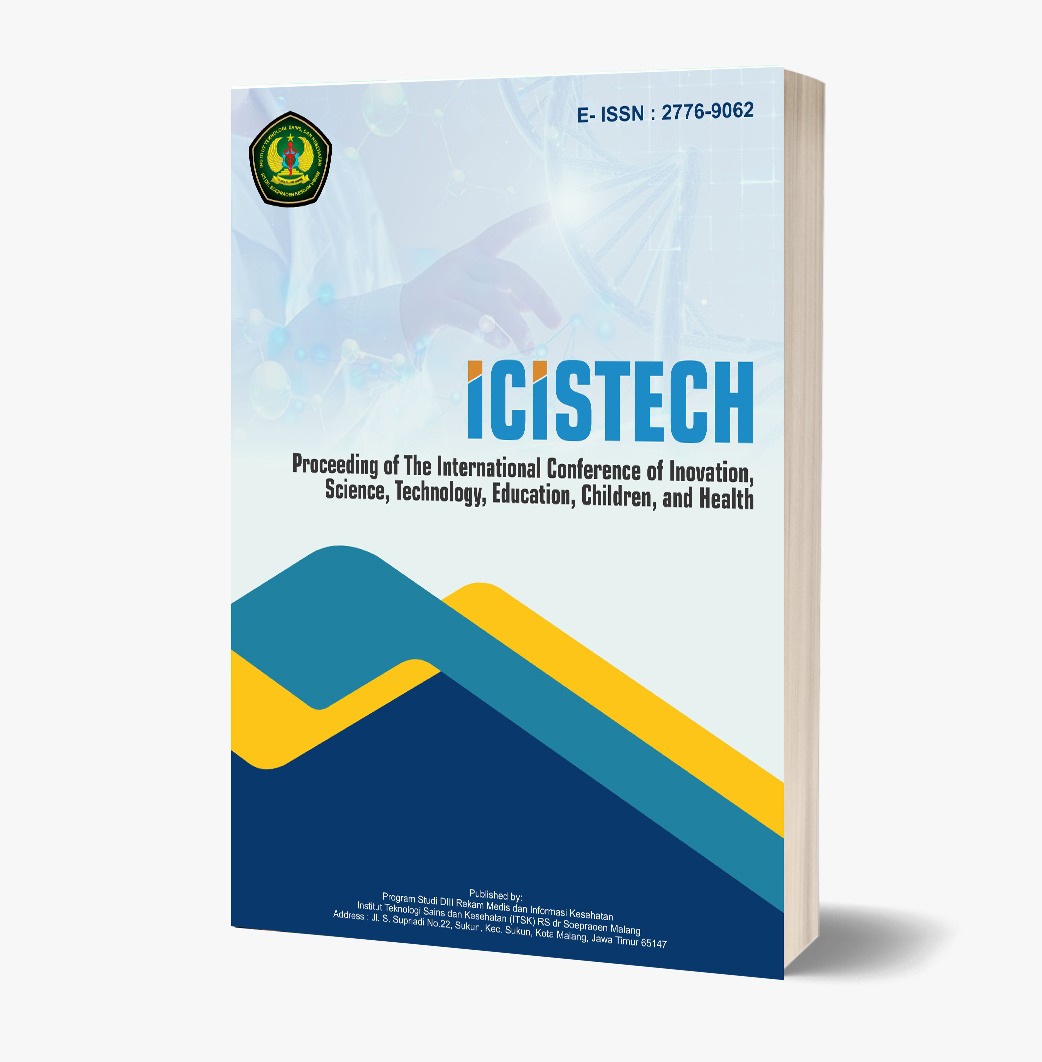LEGAL PROTECTION FOR DOCTORS AND LEGAL CONSEQUENCES FOR PATIENTS WHO LIE ABOUT MEDICAL STATUS IN THE TIME OF THE COVID-19 PANDEMIC
DOI:
https://doi.org/10.62951/icistech.v1i1.4Keywords:
Legal Protection, Legal Consequences, LieAbstract
The Covid-19 pandemic has caused deep sorrow for the world community and Indonesian people. In fighting the Covid-19 pandemic, doctors are a profession at the forefront. But in fact, many patients lie about their medical status which is an obstacle to eradicating the Covid-19 pandemic. This study aims to determine how the legal protection of doctors and what are the legal consequences of patients who lie about their medical status. The research method used in this research is normative legal research and empirical law. The results of the study explain that the health worker profession really needs to get legal protection in carrying out its duties, as well as the right to occupational safety and health in providing health services and the legal consequences for patients who lie have been described in article 14 paragraph (1) of Law of the Republic of Indonesia Number 4 1984 regarding the outbreak of infectious diseases.
References
H. Davidson, “First Covid-19 case happened in November, China government records show,” Guard., 2020.
The Guardian, “First Covid-19 case happened in November, China government records show - report | World news | The Guardian,” The guardian. 2020.
R. D’amore, “Coronavirus: Where did it come from and how did we get here?,” 2020.
WHO, “WHO Director-General’s opening remarks at the media briefing on COVID-19 -20 November 2020,” 2020. .
Ontran Sumantri Riyanto, David Maharya Ardyantara, Raditya Sri Krisnha Wardhana, and Laurensius Lungan, “Legal Protection For Doctors Against Dishonesty Of Patients In Providing Information During Covid-19 Pandemic,” Int. J. Sci. Technol. Manag., 2021, doi: 10.46729/ijstm.v2i1.118.
CNN, “ITB: Corona RI Peak End of March,” 2020. https://www.cnnindonesia.com/teknologi/20200319142837-199-484974/itb-puncak-corona-ri-akhir-m aret-ends-middle-april-2020.
J. J. V. Bavel et al., “Using social and behavioural science to support COVID-19 pandemic response,” Nature Human Behaviour. 2020, doi: 10.1038/s41562-020-0884-z.
A. G. Sari and R. Y. Bramantyo, “Legal protection of supply chain management based on technology in the eradication of the covid-19 plague,” Int. J. Adv. Sci. Technol., 2019.
P. E. Napoli, M. Nioi, E. d’Aloja, and M. Fossarello, “Safety Recommendations and Medical Liability in Ocular Surgery during the COVID-19 Pandemic: An Unsolved Dilemma,” J. Clin. Med., 2020, doi: 10.3390/jcm9051403.
Praktik Kedokteran. 2004.
KEMENKES, “Peraturan Menteri Kesehatan Republik Indonesia Nomor 11 Tahun 2017 Tentang Keselamatan Pasien Dengan,” Prog. Phys. Geogr., 2017.
Indonesia, Undang-Undang Republik Indonesia Nomor 4 Tahun 1984 Tentang Wabah Penyakit Menular. 1984.
J. Ludwikowska, “Uncovering the secret: Medieval women, magic and the other,” Studia Anglica Posnaniensia. 2014, doi: 10.2478/stap-2014-0009.
S. S. Zenin, D. L. Kuteynikov, O. A. Izhaev, and I. M. Yapryntsev, “Law Making in the Conditions of Algorithmization of Law,” Lex Russ., 2020, doi: 10.17803/1729-5920.2020.164.7.097-104.
J. Stapleton, “Legal Cause: Cause-in-Fact and the Scope of Liability for Consequences,”Vanderbilt Law Rev., 2001.
F. Di Gennaro et al., “Coronavirus diseases (COVID-19) current status and future perspectives: A narrative review,” International Journal of Environmental Research and Public Health. 2020, doi: 10.3390/ijerph17082690.
Y. Wu et al., “SARS-CoV-2 is an appropriate name for the new coronavirus,” The Lancet. 2020, doi: 10.1016/S0140-6736(20)30557-2.
A. E. Gorbalenya et al., “The species Severe acute respiratory syndrome-related coronavirus: classifying 2019-nCoV and naming it SARS-CoV-2,” Nature Microbiology. 2020, doi: 10.1038/s41564-020-0695-z.
R. Tosepu et al., “Correlation between weather and Covid-19 pandemic in Jakarta, Indonesia,” Sci. Total Environ., 2020, doi: 10.1016/j.scitotenv.2020.138436.
Undang-Undang Republik Indonesia, “Undang-Undang No. 36 Tahun 2014 tentang Tenaga Kesehatan,” UU RI No. 36 Tahun 2014, 2014.
Kementerian Sekretariat Negara RI, “Undang-Undang Ketenagakerjaan,” Republik Indones., 2003.
M. Lee, S. Park, M. Choi, and K.-S. Lee, “Unmet Medical Needs of Patients with Benign Prostate Enlargement,” J. Clin. Med., 2020, doi: 10.3390/jcm9040895.
P. Esmaeilzadeh, “The effect of the privacy policy of Health Information Exchange (HIE) on patients’ information disclosure intention,” Comput. Secur., 2020, doi: 10.1016/j.cose.2020.101819.
Permenkes RI, “Kewajiban Rumah Sakit dan Kewajiban Pasien,” Interciencia. 2018.
A. N. Nasrabadi, S. Joolaee, E. Navab, M. Esmaeili, and M. Shali, “White lie during patient care: A qualitative study of nurses’ perspectives,” BMC Med. Ethics, 2020, doi: 10.1186/s12910-020-00528-9.
S. A. Lie, S. W. Wong, L. T. Wong, T. G. L. Wong, and S. Y. Chong, “Practical considerations for performing regional anesthesia: lessons learned from the COVID-19 pandemic,” Canadian Journal of Anesthesia. 2020, doi: 10.1007/s12630-020-01637-0.
H. S. Gordon, P. Solanki, B. G. Bokhour, and R. K. Gopal, “‘I’m Not Feeling Like I’m Part of the Conversation’ Patients’ Perspectives on Communicating in Clinical Video Telehealth Visits,” J. Gen. Intern. Med., 2020, doi: 10.1007/s11606-020-05673-w.
N. Sun et al., “Qualitative study of the psychological experience of COVID-19 patients during hospitalization,” J. Affect. Disord., 2021, doi: 10.1016/j.jad.2020.08.040.
S. Grover, D. Dua, S. Sahoo, A. Mehra, R. Nehra, and S. Chakrabarti, “Why all COVID-19 hospitals should have mental health professionals: The importance of mental health in a worldwide crisis!,” Asian J. Psychiatr., 2020, doi: 10.1016/j.ajp.2020.102147.
R. Barnard, J. Jones, and M. Cruice, “When interactions are interruptions: an ethnographic study of information-sharing by speech and language therapists and nurses on stroke units,”Disabil. Rehabil., 2021, doi: 10.1080/09638288.2021.1871785.
T. Kuriakose, “History Taking: The Most Important Clinical Test,” in Clinical Insights and Examination Techniques in Ophthalmology, 2020.
P. Li, G. H. Lee, S. Y. Kim, S. Y. Kwon, H. R. Kim, and S. Park, “From Diagnosis to Treatment: Recent Advances in Patient-Friendly Biosensors and Implantable Devices,”ACS Nano. 2021, doi: 10.1021/acsnano.0c06688.
Undang- Undang Republik Indonesia, “Undang-Undang RI No. 29 Tahun 2004 Tentang Praktik Kedokteran,” Undang. RI No. 29 Tahun 2004 Tentang Prakt. Kedokt., 2004.
Permenkes, “Peraturan Menteri Kesehatan Republik Indonesia Nomor 11 Tahun 2017 Tentang Keselamatan Pasien Dengan,” Prog. Phys. Geogr., 2017.
Downloads
Published
How to Cite
Issue
Section
License
Copyright (c) 2024 Proceeding of The International Conference of Inovation, Science, Technology, Education, Children, and Health

This work is licensed under a Creative Commons Attribution-ShareAlike 4.0 International License.













